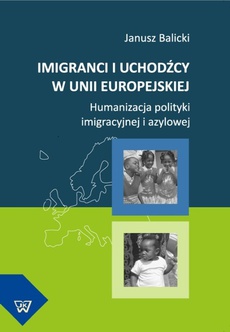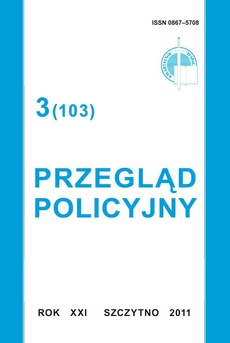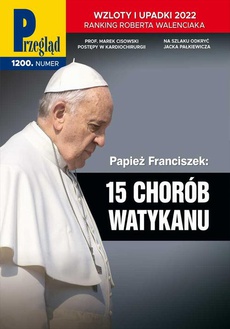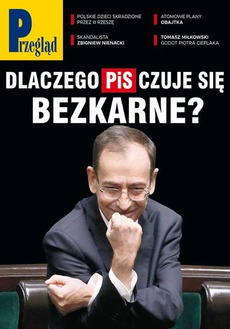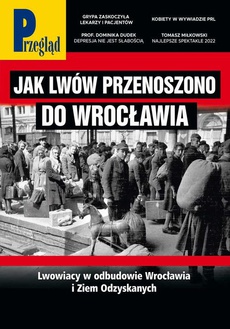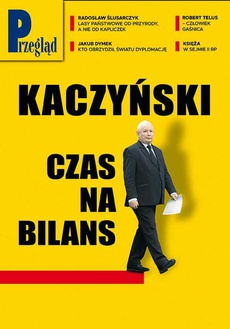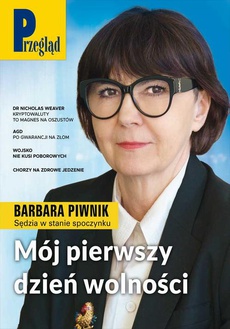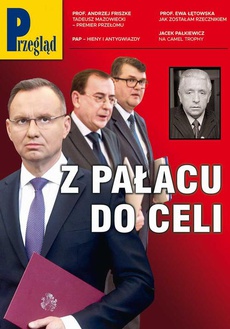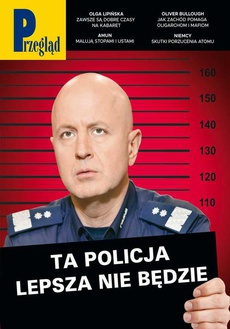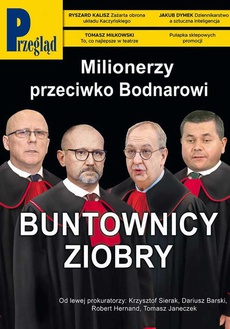POLECAMY
Przegląd Europejski 1/2021
Redakcja:
Wydawca:
Format:
ibuk
Tematem przewodnim numeru jest analiza różnych aspektów wpływu na Europę pandemii COVID-19, której skutki stały się wyzwaniem finansowym, prawnym oraz politycznym. W artykułach poruszających te zagadnienia rozpatrywane są instrumenty antykryzysowe wprowadzone w Unii Europejskiej oraz implikacje dla budżetu UE i jej państw członkowskich, a także zasada proporcjonalnej ostrożności jako środek zapobiegawczy w walce z COVID-19. Autorzy przyglądają się obecnej polityce państw związanej z pandemią i między innymi zastanawiają się, czy europejska koncepcja praw człowieka przetrwa stan zagrożenia zdrowia publicznego.
Poza tym w numerze znajdują się teksty omawiające geopolityczne koncepcje Europy Środkowej, kwestie oceny nastrojów ksenofobicznych czy też poświęcone badaniu tożsamości imigrantów z Bliskiego Wschodu jako wyzwania dla integracji ze społeczeństwami europejskich państw przyjmujących. W kilku artykułach polscy i zagraniczni naukowcy opisują dzieje oraz stan obecny dialogu między Unią Europejską i Rosją.
*****
The main theme of the issue is the analysis of various aspects of the impact on Europe of the COVID-19 pandemic, the consequences of which have become a financial, legal and political challenge. Articles dealing with these issues examine the anti-crisis instruments introduced in the European Union and the implications for the budget of the EU and its Member States, as well as the principle of proportional precaution as a preventive measure in the fight against COVID-19. The authors look at current national policies related to the pandemic and, among other things, wonder whether the European concept of human rights will survive a public health emergency.
Apart from that, the issue features texts discussing geopolitical concepts of Central Europe, problems of assessing xenophobic sentiments, or devoted to the study of the identity of immigrants from the Middle East as a challenge for integration into the societies of European host countries. In several articles, Polish and foreign scholars describe the history and current state of dialogue between the European Union and Russia.
| Rok wydania | 2021 |
|---|---|
| Liczba stron | 265 |
| Kategoria | Europeistyka |
| Wydawca | Uniwersytet Warszawski |
| Numer wydania | 1 |
| Informacja o sprzedawcy | ePWN sp. z o.o. |
Ciekawe propozycje
Spis treści
| TEORIA I METODOLOGIA STUDIÓW EUROPEJSKICH | |
| Bořivoj HNÍZDO • Koncepcje geopolityczne Europy Środkowej a współczesna rzeczywistość: perspektywa językowa | 13 |
| Andrey A. KINYAKIN, Dmitry A. KOTOV, Sergey A. STEPANOV • Ocena skrajnej prawicy w Europie: analiza porównawcza nastrojów ksenofobicznych i antyimigranckich w Niemczech, Polsce i Rosji | 29 |
| Dalzar Nashwan SALEM • Tożsamość imigrantów z Bliskiego Wschodu jako wyzwanie dla integracji ze społeczeństwami państw przyjmujących | 43 |
| PRAWO, INSTYTUCJE I POLITYKI UNII EUROPEJSKIEJ | |
| Nadiya DUBROVINA, Russell GERRARD, Stanislav FILIP, Vira DUBROVINA • Modelowanie trendów finansowania ochrony zdrowia w państwach Unii Europejskiej | 61 |
| Małgorzata DZIEMBAŁA, Agnieszka KŁOS • Pandemia COVID-19 a gospodarka Unii Europejskiej – instrumenty antykryzysowe oraz implikacje dla budżetu UE i jej | |
| państw członkowskich | 81 |
| Stefan LEHRNER • Kraje Wyszehradzkie a COVID-19: czy pandemia koronawirusa jest zjawiskiem VUCA? | 99 |
| Jizeng FAN, Yuhong WANG • Zasada proporcjonalnej ostrożności jako instrumentalny środek zapobiegawczy w walce z COVID-19: czy europejska koncepcja praw człowieka przetrwa stan zagrożenia zdrowia publicznego? | 117 |
| Karol PIWOŃSKI • Pozycja i rola Komisji Europejskiej w procedurze ochrony budżetu UE w przypadku uogólnionych braków w zakresie praworządności w państwach | |
| członkowskich | 145 |
| Izabela ZAWIŚLIŃSKA, Piotr CIRIN • Występowanie deficytów bliźniaczych w wybranych państwach Unii Europejskiej i w Polsce w latach 2009–2018 | 157 |
| Karolina PIECH • Czy ciasna cela to brak humanitaryzmu? – uwagi na gruncie art. 3 Europejskiej Konwencji Praw Człowieka | 179 |
| Oleksandr ZHYTNYI, Mykhailo SPIRIDONOV, Andrii VASYLIEV • Криминализация нарушения права на защиту как средство его обеспечения (опыт национального нормотворчества) | 191 |
| HISTORIA, KULTURA I SPOŁECZEŃSTWO W EUROPIE | |
| Paweł HUT • Karta Polaka jako instrument polityki łączności z zagranicznymi rodakami w latach 2008–2020 | 203 |
| Dariusz JURCZAK, Anatolii KIBYSH • Administracja publiczna a bezpieczeństwo migrującej społeczności lokalnej pogranicza polsko-rosyjskiego | 217 |
| Valentina PRUDSKAYA • Dialog regionalny między Unią Europejską i Rosją jako instrument rozwoju współpracy dwustronnej | 233 |
| IMPRESJE EUROPEJSKIE | |
| Maria A. IVANOVA • Гражданское общество в Российской Федерации: особенности развития и отличия от европейских государств | 253 |
| Rafał CZACHOR • Recenzja książki "From Triumph to Crisis. Neoliberal Economic Reform in Postcommunist Countries", Cambridge University Press 2018, 243 str. | 259 |
| THEORIES AND METHODS IN EUROPEAN STUDIES | |
| Bořivoj HNÍZDO • Geopolitical concepts of Central Europe and current reality: language perspective | 13 |
| Andrey A. KINYAKIN, Dmitry A. KOTOV, Sergey A. STEPANOV • Measuring the far-right in Europe: comparative analysis of the xenophobic and antiimmigrant sentiment in Germany, Poland and Russia | 29 |
| Dalzar Nashwan SALEM • The identity of immigrants from the Middle East as a challenge for integration with societies of the host countries | 43 |
| EU LAW, INSTITUTIONS AND POLICIES | |
| Nadiya DUBROVINA, Russell GERRARD, Stanislav FILIP, Vira DUBROVINA • Modelling the trends of the healthcare funding in the EU countries | 61 |
| Małgorzata DZIEMBAŁA, Agnieszka KŁOS • The COVID-19 pandemic and the European Union economy – counter-crisis instruments and implications for the EU budget and its Member States | 81 |
| Stefan LEHRNER • Visegrad countries and COVID-19: is the coronavirus pandemic a VUCA phenomenon? | 99 |
| Jizeng FAN, Yuhong WANG • Precautionary proportionality principle as an instrumental preventive measure from the COVID-19: Can European human rights survive in the state of public health emergency? | 117 |
| Karol PIWOŃSKI • The position and role of the European Commission in the procedure for the protection of the EU budget in case of generalised deficiencies as regards the rule of law in the Member States | 145 |
| Izabela ZAWIŚLIŃSKA, Piotr CIRIN • Prevalence of twin deficits in selected European Union countries and in Poland in the years 2009-2018 | 157 |
| Karolina PIECH • Does a tight cell mean a lack of humanitarianism? – comments under Art. 3 of the European Convention on Human Rights | 179 |
| Oleksandr ZHYTNYI, Mykhailo SPIRIDONOV, Andrii VASYLIEV • Criminalisation of violation of the right to defence as a remedy for its enforcement (national legislative experience) | 191 |
| HISTORY, CULTURE AND SOCIETY IN EUROPE | |
| Paweł HUT • The Polish Card as a tool of the policy of the communication with foreign compatriots in years 2008–2020 | 203 |
| Dariusz JURCZAK, Anatolii KIBYSH • Public administration and security of the migrating local community of the Polish-Russian borderland | 217 |
| Valentina PRUDSKAYA • Regional dialogue between the European Union and Russia as an instrument for the development of bilateral cooperation | 233 |
| EUROPEAN IMPRESSIONS | |
| Maria A. IVANOVA • Civil society in Russian Federation: features of development and differences from European countries | 253 |
| Rafał CZACHOR • Book review: Hilary Appel, Mitchell A. Orenstein (2018), From Triumph to Crisis. Neoliberal Economic Reform in Postcommunist Countries, Cambridge University Press, 243 pages | 259 |






